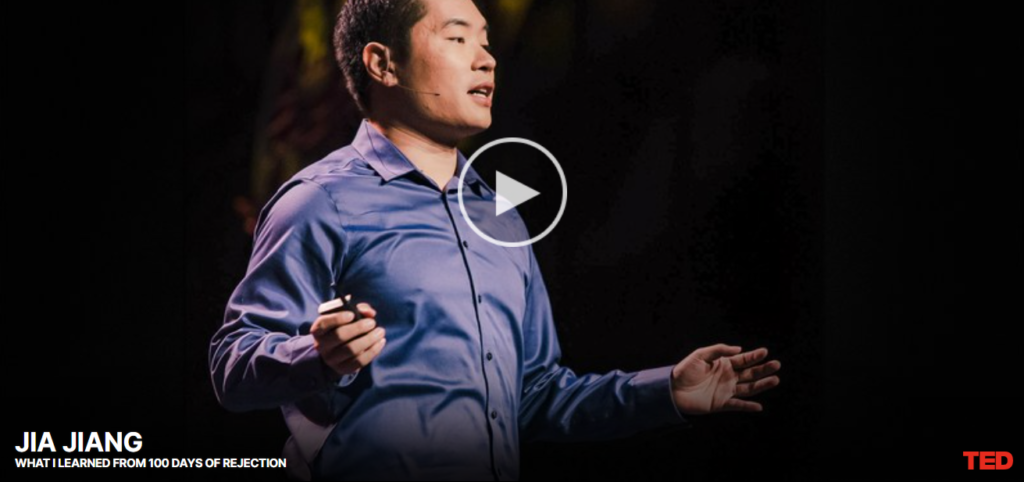Rejection. Every writer who’s ever auditioned in publishing knows the feeling. Some more than others because some writers are punishment gluttons who keep on submitting queries despite many times being shouted at, “No!”
There’s a famous Stephen King quote that goes, “By the time I was fourteen the nail in my wall would no longer support the weight of the rejection slips impaled upon it. I replaced the nail with a spike and went on writing.”
I don’t know how many rejections Mr. King got before he struck gold with Carrie, but I do know of a man who purposely set out to experience one hundred days of rejections. His name is Jia Jiang, and he put on a marvelous TEDx Talk called What I Learned From 100 Days of Rejection. It’s a must-watch for all writers, entrepreneurs, and creatives who wander into the crosshairs of criticism and rejection.
Spoiler Alert: Jia Jiang was emotionally traumatized as a six-year-old, first-grader when his teacher tried a social experiment that publicly humiliated him. He was so scarred that it wasn’t until his thirties that he faced up to his fear of public rejection. Mr. Jiang overtook his fear by intentionally devising one hundred creative ways to approach strangers and filming their responses to his “crazy” proposals.
Jiang’s crazy proposals went viral, and he now travels the world giving keynote presentations and holding workshops helping others overcome their fear of rejection. You can watch his amusing and informative TEDx Talk here, and you can visit his website RejectionTherapy.com here. You can also source his book Rejection Proof — How I Beat Fear and Became Invincible Through 100 Days of Rejection.
I’ll leave you with a rejection story that happened to me. I finished my first novel manuscript in 2011. I paid to have it professionally edited and, when it was done-as-good-as-it-was-going-to-get-done, I shopped it around the agents. I don’t remember exactly who or how many—probably thirty or forty—even some big names as well as some newbies. I maybe heard back from ten of which eight or so were form rejections.
There was not even one request for a look. So, I moved on. That was when indies were starting to take hold in ebooks, so I went that route. My debut did well on the Amazon charts and, not long after its release, I got an unsolicited email from a literary agent asking if I was represented to which I said, “No.”
I won’t say who, but they requested my complete manuscript to which I complied. After a few weeks, the agent got back to me. “It’s a pass on this one,” they said. “I didn’t quite connect with the story, but I will say you have a really good voice. Send me your next one. If you write it, I’ll read it.”
To which I did. I sent them my sequel—the full 90K word ms—as a Word.doc attachment direct to the agent’s personal email they first cold-called me from and complimented my voice.
Well… I got back this icy, snot-infused reply. “How dare you bypass the company submission guidelines and contact me directly!” BTW, I just Googled that agent and can’t find them working today.
So, Kill Zoners, that’s my rejection story. How about yours? Let’s hear who’s been snubbed by the world and how badly it went.


